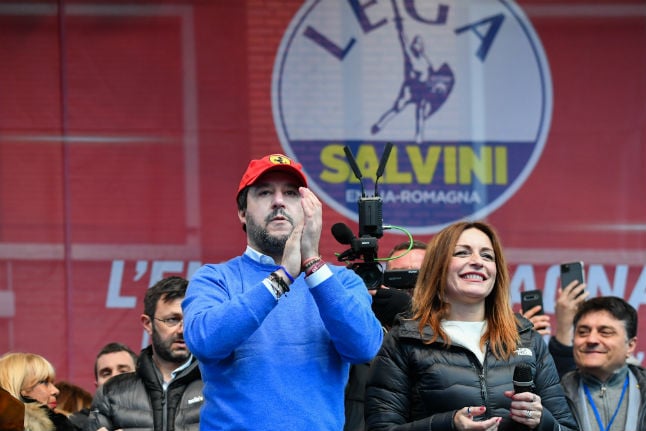ELECTION
Salvini seeks to topple government in key regional poll
Italians vote Sunday in a key regional election which the far-right hopes will shake the country's fragile coalition government to its core and return strongman Matteo Salvini to power.
Published: 26 January 2020 07:32 CET

League leader Matteo Salvini together with centre-right Senator and regional candidate Lucia Borgonzoni on stage during a rally on January 18. Photo: Andreas Solaro/AFP
The wealthy centre-north region of Emilia Romagna has been a stronghold of the Italian left for over 70 years, but while left-wing values still hold sway in its cities, the right has been rallying serious support in towns and the countryside.
The last polls published before the pre-election media blackout showed the anti-immigrant League neck-and-neck with the centre-left Democratic Party (PD), which governs Italy in coalition with the anti-establishment Five Star Movement (M5S).
Some 3.5 million citizens are eligible to cast ballots to elect the region's president between 7am (0600 GMT) and 11pm, alongside similar regional elections in the smaller southern region of Calabria.
The League hopes for a repeat of its historic win in October in Umbria, which had been a left-wing fiefdom for 50 years.
Its candidate in Emilia Romagna, Lucia Borgonzoni, 43, has been overshadowed by Salvini, who has held daily rallies and inundated social media with snaps of him sampling delicacies in the Parma ham and Parmesan cheese heartland.
Salvini infuriated the left on Saturday by breaking the pre-election silence — which under Italian law means candidates cannot campaign the day before a vote — by tweeting about the “eviction notice” he was set to deliver to the government.
The PD's candidate Stefano Bonaccini is the incumbent president and is hoping to win for his track record in the region, which boasts low jobless figures and is home to “Made in Italy” success stories such as Ferrari and Lamborghini.
He may also benefit from the youth-driven Sardines movement, which was born in the region just a couple of months ago but has fast become a national symbol of protest against the far-right.
But analysts say many local family-run, artisanal firms are disgruntled and feeling left behind by the march of globalisation.
Others say the traditional left has abandoned those it once sought to defend for big banking interests.
'Cling to power'
The League triumphed in Emilia Romagna at the European Parliament elections in May, becoming the leading party with nearly 34 percent of the votes, topping the PD's 31 percent.
Just five years earlier it had taken home a mere 5.0 percent, compared to the PD's 53 percent.
Prime Minister Giuseppe Conte has dismissed fears of a government crisis should the Salvini's party win, saying the election concerns the region alone and has no bearing on national politics.
The coalition's main stabilising factor is a joint fear of snap elections which would likely hand power to Salvini, whose party is well ahead in national polls.
The government “will cling on to power in the near term,” said Agnes Ortolani, analyst at The Economist Intelligence Unit.
But a League victory would increase tensions considerably, with the PD likely to blame the M5S for refusing to join forces behind a single candidate — thus splitting the anti-Salvini vote.
And analysts have warned it could cause the M5S, which is riven by infighting and has been hemorrhaging members, to collapse.
Contested M5S head Luigi Di Maio resigned Wednesday in a bid to stave off a crisis — but political watchers cautioned that it may not be enough.
“If the PD were to lose another regional bastion after Umbria three months ago, it may conclude that it would have more to lose from staying in alliance with the ever-weaker M5S than from risking new elections,” Berenberg Economics said Friday.
Url copied to clipboard!



 Please whitelist us to continue reading.
Please whitelist us to continue reading.
Member comments